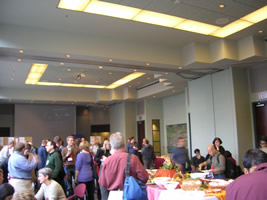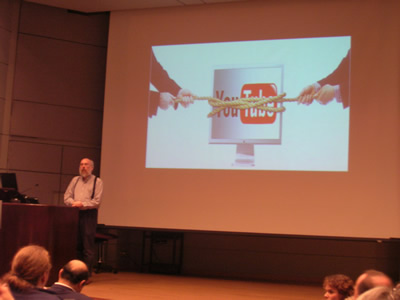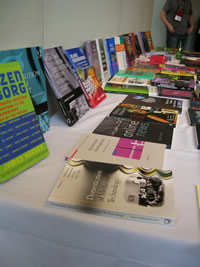It’s almost a week now since the AOIR conference „Let’s play“ ended. I’m not really good at live conference blogging, especially after I’ve witnessed Axel Bruns‘ speed – it seemed he had his accounts of all the sessions published even before they began -, but I should at least summarize some of my impressions and thoughts.
First of all: It was a very good conference, and I’m pretty glad I had the chance to attend. I missed the call for papers, but fortunately Nancy Baym invited me to take part in the round table on Social Netwoking Sites, which provided the impetus for travelling to Vancouver in the first place.
 I’ve never been to an AOIR conference before; the size (~350 attendants, I’d guess) makes it pretty similar to the GOR conferences, but there are a couple of differences: The GOR appeals to people from both the academic and the commercial fields of online research, including an exhibition where the state of the art of survey tools and technologies is presented. The AOIR conferences, in contrast, draws mainly the academic crowd, ranging from undergraduates to established professors, and it seems to be somewhat more international than the GOR (although they have been successful in opening up their conference over the last years).
I’ve never been to an AOIR conference before; the size (~350 attendants, I’d guess) makes it pretty similar to the GOR conferences, but there are a couple of differences: The GOR appeals to people from both the academic and the commercial fields of online research, including an exhibition where the state of the art of survey tools and technologies is presented. The AOIR conferences, in contrast, draws mainly the academic crowd, ranging from undergraduates to established professors, and it seems to be somewhat more international than the GOR (although they have been successful in opening up their conference over the last years).
Even more striking: At GOR conferences, most of the presented research is quantitative in nature, while at the AOIR the majority of presentations and papers (at least the ones I’ve seen, maybe coincidence) were qualitative. I would actually love to see more qualitative approaches at the GOR – there is a lot to be gained from analyses that do not rely on large-scale surveys or calculations of regression coefficients, but rather aim to reconstruct meaning or narratives of recent developments in the Internet. And although I found some of the AOIR presentations lacking substance or analytical depth (granted, I have the same feeling at GOR conferences), I was generally very impressed by the variety of topics, disciplines and approaches that were represented.
 Definite highlights were the three keynotes: Henry Jenkins (MIT) was great; I’m following his blog for quite some time now and am really impressed at the way he is thinking about current cultural trends that manifest online as well as in a lot of offline places. He speaks about „convergence culture“, meaning a) a process of cultural and economic change that is emphasizing transmedia entertainment and the separation of content from technological platforms (comic books become movies become games), b) the harnessing of „collective intelligence“ where individuals pool their knowledge to create something bigger (at the heart of a lot of developments within the social web) and c) the rise of participatory culture, meaning that professionally produced media content is reworked or remixed by fans (closely related to Axel Bruns‘ idea of produsage). If you are interested in the interplay of technological and cultural changes, go subscribe to Jenkins‘ blog! :)
Definite highlights were the three keynotes: Henry Jenkins (MIT) was great; I’m following his blog for quite some time now and am really impressed at the way he is thinking about current cultural trends that manifest online as well as in a lot of offline places. He speaks about „convergence culture“, meaning a) a process of cultural and economic change that is emphasizing transmedia entertainment and the separation of content from technological platforms (comic books become movies become games), b) the harnessing of „collective intelligence“ where individuals pool their knowledge to create something bigger (at the heart of a lot of developments within the social web) and c) the rise of participatory culture, meaning that professionally produced media content is reworked or remixed by fans (closely related to Axel Bruns‘ idea of produsage). If you are interested in the interplay of technological and cultural changes, go subscribe to Jenkins‘ blog! :)
John Lester of Linden Labs gave an introduction to Second Life – nothing groundbreaking there, but a lively presentation with a lot of stories; and Second Life was one of the big issues at the conferences (probably topped only by Facebook…).
John Willinsky very strongly advocated ideas of open access, half-jokingly stating that the saying about Web 2.0 and user-generated content „you make all the content, they keep all the wealth“ is also for scholarly publications and journal publishers. He mentioned the Open Journal System [?], an open source software for journal management which looks pretty interesting; I hope I’ll find find some time soon to test install it – it might help us with the management of kommunikation@gesellschaft.
 Around the keynotes there were usually six or seven parallel sessions per slot which made it pretty hard to choose. I mainly focussed on those dealing with blogs and/or social networking sites, or with game studies (since my new job in Hamburg might offer opportunities to research this field as well), but don’t want to recap all of the presentations – you can browse the abstracts at the conference site, and the better ones will surely be published in journals soon. My facebook network has grown significantly since the conference, which is a pretty good indicator of a lot of interesting conversations I had. Add to this the perfect organization, the free and working WiFi, the great catering (there is no good conference if there is bad catering) and last but not least the current strength of the EURO against the Dollar which made my buy too many books from the conference books store :) – All in all I had a great time in Vancouver!
Around the keynotes there were usually six or seven parallel sessions per slot which made it pretty hard to choose. I mainly focussed on those dealing with blogs and/or social networking sites, or with game studies (since my new job in Hamburg might offer opportunities to research this field as well), but don’t want to recap all of the presentations – you can browse the abstracts at the conference site, and the better ones will surely be published in journals soon. My facebook network has grown significantly since the conference, which is a pretty good indicator of a lot of interesting conversations I had. Add to this the perfect organization, the free and working WiFi, the great catering (there is no good conference if there is bad catering) and last but not least the current strength of the EURO against the Dollar which made my buy too many books from the conference books store :) – All in all I had a great time in Vancouver!
BTW: This time, we were only four german attendants, but the next AOIR conference will be in Copenhagen (in Oct 2008), much closer to home… See you there… :)
Ein Kommentar